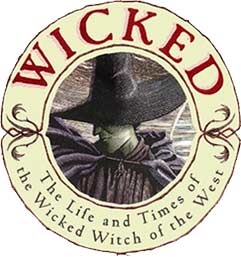This past semester while teaching my American Fantasy class, I wrote several posts describing The Wizard of Oz as a quintessentially American fairy tale. Dorothy Gale is raised in the drought stricken years of the late 19th century’s “long depression” but refuses to give up hope, as Uncle Henry and Aunt Em have done. Combining a childhood idealism with a pioneer woman’s can-do spirit, she manages to restore self-belief in her traveling companions. Thanks to her, they find the wisdom, the heart, and the courage that was always within them. American can be strong again.
Baum’s book was an instant success, as was the 1939 MGM film, which tapped into the same American dreaming. Both book and film have achieved archetypal status and consequently have merged in the popular imagination, just as different versions of Cinderella have merged. We are no longer dealing with specific texts but an American myth.
Because it is a myth, it provides contemporary authors with a rich reservoir of images. My student Abby Doyle alerted me to how Gregory Maguire uses the Oz story in his novel Wicked: The Life and Times of the Wicked Witch of the West (1995).
The novel speaks to the existential crisis that America has been undergoing for several decades now with the hollowing out of the middle class. In other words, the myth appears to resurface when the American dream clashes with the economic facts on the ground.
Maguire’s Oz has many of the same problems as contemporary America. Whereas the Munchkins for Baum were idyllic Pennsylvania Dutch farmers, for Maguire they are narrow-minded people who are torn between religious fundamentalism and a pornographic longing for the pleasures they have repressed. Meanwhile the country as a whole is socially stratified, with discrimination directed against both Animals (which can talk) and animals (which can’t). The Wizard of Oz is a manipulating autocrat.
Elphaba, who will become the Wicked Witch of the West, is initially an idealistic college student who believes that Animals should have equal rights and animals as well. Ultimately she goes crazy over the unfairness that she witnesses and that she herself experiences as a result of her green skin. Her clash with Dorothy is almost accidental.
Maguire’s Dorothy is not the confident little girl of the Baum novel and MGM movie. Guilt-ridden over what she has done to Elphaba’s sister, she is seeking to make amends. The people of Oz, however, do not see her this way. Rather, they project their hopes on to her, regarding her as a savior for her victory over the witch. They call her self-delusional when she describes it as an accident.
In other words, Maguire sees the Oz fantasy as denial about the real character of America. He is critiquing the willful self-blindness that has arisen in a country that wants to see itself as exceptional, his bitter vision counteracting the sugary sweet fantasy that we as a country feed on.
Meanwhile, those social reformers who see reality for what it is become disillusioned and go mad. The rest of the country condemns them for their lack of faith and regards them as witches.
Previous posts on the Oz story
Wizard of Oz, America’s Greatest Fairy Tale


